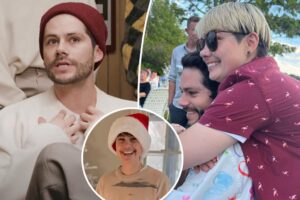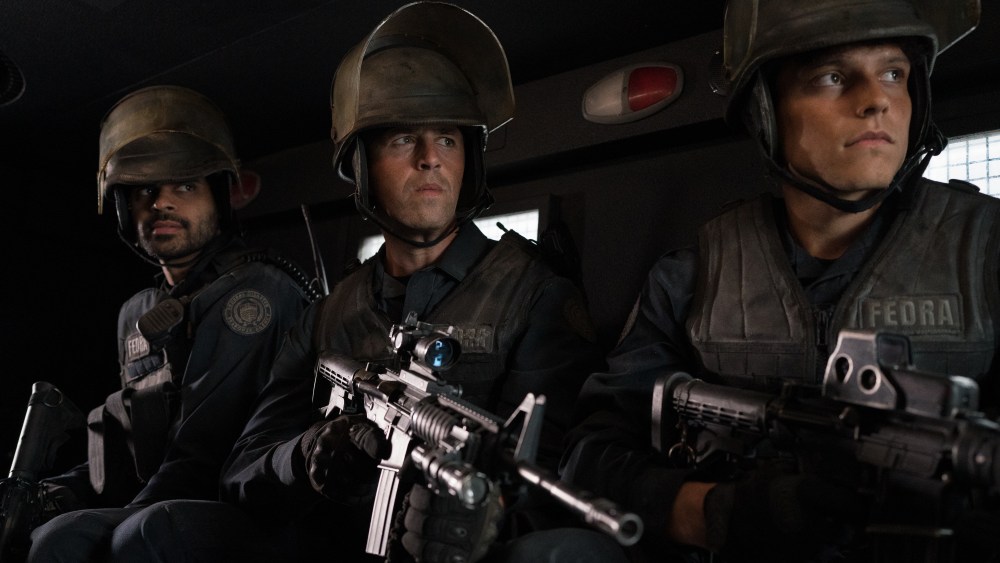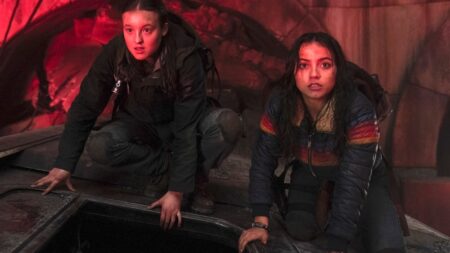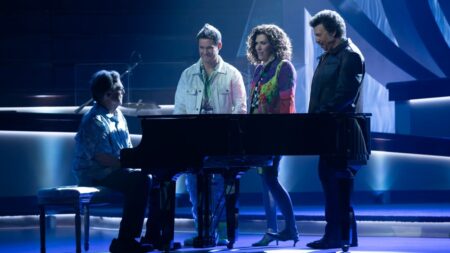SPOILER ALERT: This story contains spoilers from “Day One,” Season 2, Episode 4 of “The Last of Us,” now streaming on Max.
There was an unexpected “Drake & Josh” and “The Last of Us” crossover on Sunday night.
Josh Peck, the Nickelodeon icon who also stole scenes as a Manhattan Project scientist in “Oppenheimer,” popped up at the beginning of HBO’s newest episode of “The Last of Us.” He delivered a memorable monologue as Janowitz, a Federal Disaster Response Agency soldier who bonded with his brothers-in-arms by telling them an expletive-ridden story about detaining “voters” — the ironic FEDRA nickname for Quarantine Zone residents who’ve had their rights stripped away.
In a departure from “The Last of Us Part II” video game, the show flashes back to 2018, as soldiers in the Seattle Quarantine Zone are riding in the back of a cramped van to a mission. Janowitz entertains his buddies by telling them about the time he stopped three voters who were disseminating religious pamphlets. He recalls getting backup from Greenberg, a particularly violent FEDRA soldier who apparently confused “disseminating” for “jerking off and splooging in the streets.” Janowitz says that when one of the detainees corrected Greenberg, the officer slammed his head into the wall and yelled “Nobody asked you, jizzboy!”
The story gets raucous laughter from his comrades, except for one person: Jeffrey Wright’s stern, humorless Isaac Dixon. “The Last of Us Part II” gamers know that Isaac is the leader of the Washington Liberation Front who helped take control of the region from FEDRA, but little is known about his past. It turns out in the show, Isaac is a FEDRA sergeant who betrays his own men to help the local rebels, who are led by Alanna Ubach’s character, Hanrahan. After their van is stopped by a blockade led by Hanrahan, Isaac gets out, greets Hanrahan then promptly throws a grenade into his vehicle full of surprised troops, locking the door behind him. Hanrahan shakes Isaac’s hand and says, “Welcome to the fight.”
Isaac’s explosive moment is underscored by Peck’s lighthearted speech that opens the episode, but, as fans know, “The Last of Us” is accustomed to shocking twists. Speaking with Variety, Peck explains how he landed his role and how he humanized his “despicable” character.
Before you auditioned, were you a fan of the video game or Season 1 of the show?
To be honest, I’m kind of a wimp. So when the show first came out, knowing how big the video game is, I didn’t watch it at first. Then when I got the audition, I’m like, “Let me make sure I understand.” Obviously I knew that people were obsessed with the show and how huge it was, but I really wanted to make sure that I was matching the tone for the audition. So I watched the first episode, and eight hours later I had watched them all. It grabbed me immediately. It was just an audition that came in and, like most great writing, when I read the scene, I was like, “I think I know how to do this.” I sent it out into the universe and hoped, but sort of didn’t expect to hear anything back because I don’t usually get things as good as this. So when I heard back, I was so excited.
What drew you in and made you want to binge the show?
Like most people, Episode 3 was one of the most beautiful love stories I’ve ever seen. I have to give so much credit to what feels like a perfectly cast show. You think about the great shows of our generation, and most of them have been on HBO, like “The Sopranos” or even a show like “Breaking Bad,” and there isn’t a single character on that show that could have been played by anyone else. That’s how I feel with “The Last of Us.” I immediately fell in love with every character I was supposed to fall in love with, and I hated everyone I was supposed to hate.
How does it feel to be on one of those generational HBO shows now?
I haven’t seen it, so I gotta take your word for it. Is it good?
It’s great. Your scene kicks off the episode, and right away I was like, “Wait, that’s Josh Peck.”
Amazing. I’ll be enjoying it when everyone else sees it on Sunday. I feel very, very lucky to have been involved and to have been able to work with someone like Craig Mazin, who I’ve been a fan of for a long time. I don’t think it’s a coincidence that anything I’ve done that’s been at a higher level, be it something like “Oppenheimer” or this or when I’ve gotten the chance to work with great actors, it feels refreshingly easy because everything has been worked out. There are no holes in the script. Everyone is at the top of their game, and you feel excited to be a part of that team.
You have all these hilarious lines, like “jizzboy” and “splooging,” in this world that’s normally very dark. What did that tell you about your character?
War can make people say and do things that they never thought they were capable of doing. It’s important that you have empathy for your characters, even when they are despicable, because otherwise I don’t really know how to humanize them. What gave me a great insight into this guy was I had to personalize the story in a way. Obviously, nothing in my life could ever match up to something this extreme and horrible, thankfully, but I could relate it to just telling my friends one of my favorite stories that still cracks me up. That was my entry point into how to personalize this thing, and strip it from the extreme nature of it and just do what this guy is doing. He’s talking to his co-workers, his friends and telling a story that happens to be pretty terrible. Another good entry point is when he confronted by his superior, the great Jeffrey Wright, he’s hurt. He’s like, “Hey, man, this is my go-to story. Aren’t we all on the same page here?” There were entry points in ways in which I could humanize it, even though what he’s talking about is beyond my understanding.
How did you find something to relate with him?
I tried to connect the story to a story in my real life that I’ve told before that’s totally benign and maybe would only make me laugh. He’s kind of talking about that he wanted to save the guys, in some respect, that were getting bullied. Like, he was almost upset or he was just throwing his hand up that this one guy who continued to talk, knowing that they had this insane fellow soldier that was going to make that person pay. It was finding these subtle, humanizing points so that I don’t look at this kid like a total monster. He’s like a consiglieri. He seemed to me like a mouthpiece. He was good at following orders and whatnot. But did I ever think that he would attain the the ranks of an Isaac? I’m not sure.
What do you think stuck out about your audition that landed you the role?
This is very actor-y inside baseball, but so much of what you get fed as an actor of my level, where you’re probably auditioning to play a supporting character, there’s not always a lot there to do. So the truth is, I’ve been bummed out before if I didn’t get a part, and my acting teacher looked at me and said, “Josh, this isn’t Hamlet.” With certain things you audition for, like some silly procedural or whatever, she’ll be like, “There’s probably 20 guys who could play this part.” So then it comes down to flavor and a look. When you get great writing and a monologue like this, you get excited as an actor, because you go there’s a lot for me to do here. I get to make a lot of choices. I get to bring myself and do the work that’s required. Those are the auditions you feel the best about because you left everything on the table. With “The Last of Us,” the writing was so good that I immediately had a very specific take and choice about who this guy was.
Where did you shoot the scene? How many days of filming did you do?
We shot on the streets of Vancouver, and then we shot on a sound stage. It was two days. I remember putting on the helmet, it was like we had just enough headroom in the vehicle that we were in. I was refreshed because if we had been more cramped it would have been tougher, but we had just the right amount of room to deliver what we needed to. The first day was all of the exterior on the street and shooting into the vehicle. Then we shot all stage the next day. What’s great about a show like this is you’re afforded the time and the resources. They built the van so they could remove the walls and get every angle that we needed.
Finally, do you have a Greenberg in your life that you pictures when you were talking about him?
Oh, yeah, I have a Greenberg in my life, and he knows who he is. You don’t know him. He’s a civilian, I don’t wanna give his name. He’s a wild, wild person.
This interview has been edited and condensed.
Read the full article here








